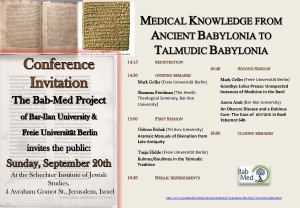Prof. Almut Renger (Head: Project C02 “Asceticism in Motion: Forms and Transfer of Habitualized Knowledge in Antiquity and Late Antiquity”) and her team are presenting an international conference on the topic of ‘Gendering Ascetic Knowledge in Christianity, Judaism, and Islam’ as part of the SFB 980 “Episteme in Motion”. L. Lehmhaus, research associate in Prof. M.J. Geller’s SFB 980 project A03 on Talmudic Medicine and BabMed affiliate, will act at the the conference as chair for the panel on Judaism.
The speakers in the conference will try to to redraw the map of asceticism in Late Antquity by focussing on the diverse processes of interreligious and intercultural transfer, dialogue and mutual exchange. Moreover, the papers seek to shed light on fairly understudied aspects of gender and body studies in relation to pre-modern ascetic practice(s) and knowledge.
Date: 22–23 October 2015
Venue: Freie Universität Berlin, Seminarzentrum, Otto-von-Simson-Str. 26,
14195 Berlin, Room L 116
The full conference programme ist published online at the SFB webpage.
Eric Schmidtchen



 Die
Die